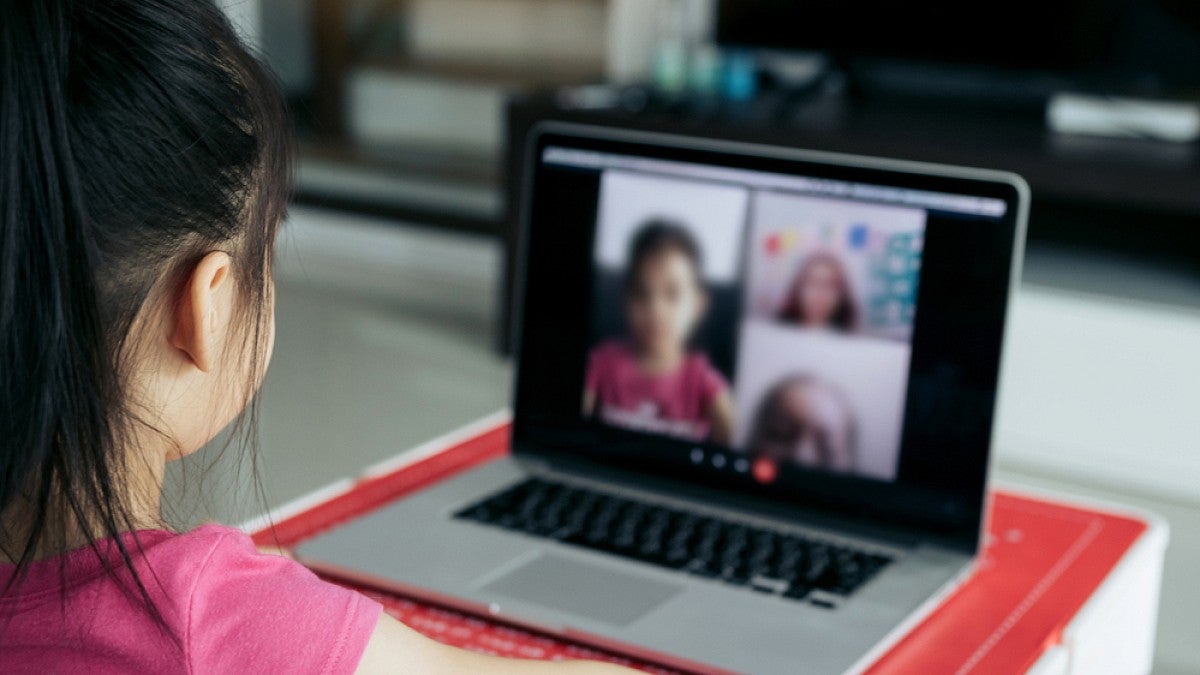As the pandemic shut people out of speech therapy options, a quick switch to teletherapy allowed a vital community clinic at the UO to stay open and kept the students who staff it on track for graduation.
“We remained the only lifeline for some clients who had services in other areas stop or shut down, and we didn’t decrease volume at all,” said Jennifer Meyer, the director of clinical education at the HEDCO Clinic’s Speech-Language-Hearing Center. “In fact, we’re serving more clients than before the pandemic hit. As things were shutting down, we were ramping up.”
When the pandemic hit full stride last spring and similar treatment clinics started closing, 30 master’s-degree students were at risk of not having enough of the required hours of experience in order to graduate in June. So, the supervising faculty of HEDCO’s six specialty clinics within the Speech-Language-Hearing Center quickly shifted to an interactive online model.
Professors spent their spring break vacation and the first week of the spring term studying the tools, methods and how-tos of providing HIPPA-compliant teletherapy.
“We were not going to drop our clients and put our students at risk of not graduating on time,” Meyer said. “All of our students graduated on time, with all required clocked hours and clinical competencies. That’s not true for all of our peer institutions.”
COVID-19 offered opportunities for innovation that the clinic used to create community while also providing support services for a population that struggled to be heard and understood.
Chenoah and Marcus Konyn, a couple who live in Eugene, said the HEDCO online group meetings and monthly caregiver support groups have been particularly helpful for their family. Their 8-year-old daughter has severe cerebral palsy and is nonverbal.
The family’s first interaction with the HEDCO Clinic was in 2019 when they attended an assistive communications camp. The camp was the first time the parents were introduced to a low-tech communications tool that could help their daughter be understood by someone outside of her family.
“It gave our daughter the opportunity to speak to the rest of the world,” Konyn said. “Every
parent wants their child to be as independent and happy and capable of building relationships as possible. Having this form of communication has completely changed our 8-year-old’s ability to communicate. You should see her face light up when she knows someone else understands her.”
Their daughter regularly attends virtual meetings where she can use her low-tech communication tool in a distance-learning setting. The parents also participate in monthly caregiver support group meetings, where they have taught others how to use the same communications tool their daughter uses.
“The biggest piece is they instilled in us a confidence that we were not going to do it wrong,” Konyn said. “But it also brings to light how far our daughter has come. It’s been quite the blessing.”
Because the HEDCO Clinic serves as a training ground, graduate students work in the clinic to get experience conducting evidence-based assessments and customizing interventions for children as young as 5 up to adults suffering from brain injuries or Parkinson’s disease, among other challenges. Members of one of the clinic’s longest-standing groups, which treats those struggling to communicate after a stroke, were grateful to attend regularly scheduled, online meetings during a time of government-mandated social distancing.
According to a group of 11 experts in voice and swallowing disorders from five different countries, teletherapy can provide multiple benefits for patients.
“Besides, our social brain is connected, and during isolation a virtual connection can help the patient recover, improve the quality of life … and bring the patient closer to family and loved ones to support the difficulties,” wrote the authors of a 2020 journal article, “Voice Therapy in the Context of the COVID-19 Pandemic: Guidelines for Clinical Practice.”
Clinicians for the transfeminine therapy group, which has been meeting online for three years, combine mental health counseling with strategies that teach clients how to change the resonance of their voice to sound more feminine. And five clients with Parkinson’s disease who formed a community choir in 2019, in partnership with the UO’s School of Music and Dance, easily shifted to a Zoom format.
Recent research has shown that older adults are at a higher risk of mental and physical health complications because of social isolation under COVID-19. So, one of the key underlying intentions for the various groups is to provide a social engagement in addition to therapy.
“They are so grateful for this opportunity because there aren’t a lot of options,” Meyer said. “Many live alone or with a single caregiver, so they don’t have a lot of opportunity to have interactions with folks.”
The center also provides virtual peer-to-peer conversations for young adults in their 20s and early 30s who use devices to talk for them. Online support groups are also available for parents and caregivers of children so “they don’t quite feel so alone.”
“There are so many challenges that happen with COVID and these kids being home all of the time instead of in school,” Meyer said. “Our group members get to practice skills with peers, parents get to connect with other people who really understand the challenges faced by these families.”
Regular clients have continued to attend individual and group meetings, and physicians, hospitals, social workers and therapists are regularly referring their patients. Clients are charged a low-cost, sliding-scale fee for services so they pay what they can, and no one is turned away for lack of funds. And, this year, numerous graduating students’ final projects are focused on providing telehealth and teletherapy services.
“It’s more than the services, it’s really a community,” Meyer said. “The clients that choose us over other options are clients who believe in training the next generation of clinicians. Our adult clients come to us over and over again. They believe they’re helping us as much as we are helping them.”
—By S. Renee Mitchell, College of Education


